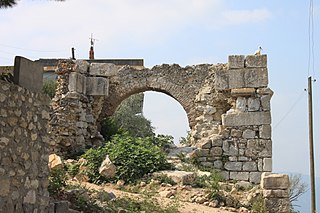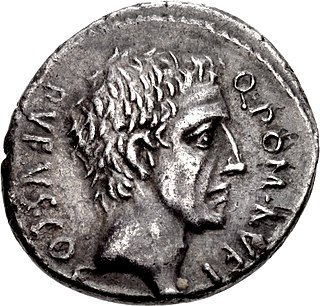Justitium (derived from the Latin term Juris statio [1] ) is a concept of Roman law, equivalent to the declaration of the state of emergency. Some scholars also refer to it as a state of exception, [2] stemming from a state of necessity. [3] It involved the suspension of civil business, typically including the courts, the treasury and the Senate and was ordered by the Roman higher magistrates. [1] It was usually declared following a sovereign's death, during the troubled period of interregnum ,[ citation needed ] but also in case of invasions. However, in this last case, it was not as much the physical danger of invasion that justified the instauration of a state of exception, as the consequences that the news of the invasion had in Rome; for example, justitium was proclaimed at the news of Hannibal's attacks. The earliest recorded occasion of justitium being invoked was for the same reason, when in 465 BC panic gripped the city due to a mistaken belief of imminent invasion by the Aequi.
According to Giorgio Agamben, justitium progressively came to mean, after the Roman Republic, the public mourning of the sovereign: a sort of privatization or diversion of the danger threatening the polis , as the sovereign claimed for himself the auctoritas , or authority, necessary to the rule of law. In his conceptualization, it is a period where the law is indefinitely suspended without being abrogated for the purpose of generating an "anomic space in which what is at stake is a force of law without law". [3]

Roman law is the legal system of ancient Rome, including the legal developments spanning over a thousand years of jurisprudence, from the Twelve Tables, to the Corpus Juris Civilis ordered by Eastern Roman emperor Justinian I. Roman law forms the basic framework for civil law, the most widely used legal system today, and the terms are sometimes used synonymously. The historical importance of Roman law is reflected by the continued use of Latin legal terminology in many legal systems influenced by it, including common law.

A tyrant, in the modern English usage of the word, is an absolute ruler who is unrestrained by law, or one who has usurped a legitimate ruler's sovereignty. Often portrayed as cruel, tyrants may defend their positions by resorting to repressive means. The original Greek term meant an absolute sovereign who came to power without constitutional right, yet the word had a neutral connotation during the Archaic and early Classical periods. However, Greek philosopher Plato saw tyrannos as a negative word, and on account of the decisive influence of philosophy on politics,
Plato deemed tyranny the "fourth and worst disorder of a state." Tyrants lack "the very faculty that is the instrument of judgment"—reason. The tyrannical man is enslaved because the best part of him (reason) is enslaved, and likewise, the tyrannical state is enslaved, because it too lacks reason and order.
Rule by decree is a style of governance allowing quick, unchallenged promulgation of law by a single person or group of people, usually without legislative approval. While intended to allow rapid responses to a crisis, rule by decree is easily abused and is often a key feature of dictatorships.
In many historical societies, the position of kingship carries a sacral meaning; that is, it is identical with that of a high priest and judge. The concept of theocracy is related, although a sacred king need not necessarily rule through his religious authority; rather, the temporal position has a religious significance.

A state of emergency is a situation in which a government is empowered to be able to put through policies that it would normally not be permitted to do, for the safety and protection of its citizens. A government can declare such a state during a natural disaster, civil unrest, armed conflict, medical pandemic or epidemic or other biosecurity risk. Justitium is its equivalent in Roman law—a concept in which the Roman Senate could put forward a final decree that was not subject to dispute yet helped save lives in times of strife.

Giorgio Agamben is an Italian philosopher best known for his work investigating the concepts of the state of exception, form-of-life and homo sacer. The concept of biopolitics informs many of his writings.
An interregnum is a period of discontinuity or "gap" in a government, organization, or social order. Archetypally, it was the period of time between the reign of one monarch and the next, and the concepts of interregnum and regency therefore overlap. Historically, longer and heavier interregna have been typically accompanied by widespread unrest, civil and succession wars between warlords, and power vacuums filled by foreign invasions or the emergence of a new power. A failed state is usually in interregnum.

Carl Schmitt was a German jurist, political theorist, and prominent member of the Nazi Party. Schmitt wrote extensively about the effective wielding of political power. A conservative theorist, he is noted as a critic of parliamentary democracy, liberalism, and cosmopolitanism. His work has been a major influence on subsequent political theory, legal theory, continental philosophy, and political theology, but its value and significance are controversial, mainly due to his intellectual support for and active involvement with Nazism. Schmitt's work has attracted the attention of numerous philosophers and political theorists, including Giorgio Agamben, Hannah Arendt, Walter Benjamin, Susan Buck-Morss, Jacques Derrida, Waldemar Gurian, Carlo Galli, Jaime Guzmán, Jürgen Habermas, Friedrich Hayek, Reinhart Koselleck, Chantal Mouffe, Antonio Negri, Leo Strauss, Adrian Vermeule, and Slavoj Žižek, among others.

Basileus is a Greek term and title that has signified various types of monarchs in history. In the English-speaking world it is perhaps most widely understood to mean "monarch", referring to either a "king" or an "emperor" and also by bishops of the Eastern orthodox church and Eastern Catholic Churches. The title was used by sovereigns and other persons of authority in ancient Greece, the Byzantine emperors, and the kings of modern Greece.
Homo sacer is a figure of Roman law: a person who is banned and might or might not be killed by anybody, but must not be sacrificed in a religious ritual.

Sir William Smith was an English lexicographer. He became known for his advances in the teaching of Greek and Latin in schools.

A Dictionary of Greek and Roman Antiquities is an English language encyclopedia first published in 1842. The second, improved and enlarged, edition appeared in 1848, and there were many revised editions up to 1890. The encyclopedia covered law, religion, architecture, warfare, daily life, and similar subjects primarily from the standpoint of a classicist. It was one of a series of reference works on classical antiquity by William Smith, the others cover persons and places. It runs to well over a million words in any edition, and all editions are now in the public domain.

Hospitium is the ancient Greco-Roman concept of hospitality as a divine right of the guest and a divine duty of the host. Similar or broadly equivalent customs were and are also known in other cultures, though not always by that name. Among the Greeks and Romans, hospitium was of a twofold character: private and public.

Apollonia or Apollonia-on-the-Rhyndacus was an ancient town opposite the delta of the Rhyndacus river in northwestern Anatolia and corresponds today to the town of Gölyazı.

The Fasti Capitolini, or Capitoline Fasti, are a list of the chief magistrates of the Roman Republic, extending from the early fifth century BC down to the reign of Augustus, the first Roman emperor. Together with similar lists found at Rome and elsewhere, they form part of a chronology referred to as the Fasti Annales, Fasti Consulares, or Consular Fasti, or occasionally just the fasti.
A state of exception is a concept introduced in the 1920s by the German philosopher and jurist Carl Schmitt, similar to a state of emergency but based in the sovereign's ability to transcend the rule of law in the name of the public good.

Clothing in ancient Greece primarily consisted of the chiton, peplos, himation, and chlamys. Ancient Greek civilians typically wore two pieces of clothing draped about the body: an undergarment and a cloak.
This is an index of articles in jurisprudence.

Quintus Pompeius Rufus was a consul of the Roman Republic in 88 BC. His colleague in office was the future dictator Sulla.